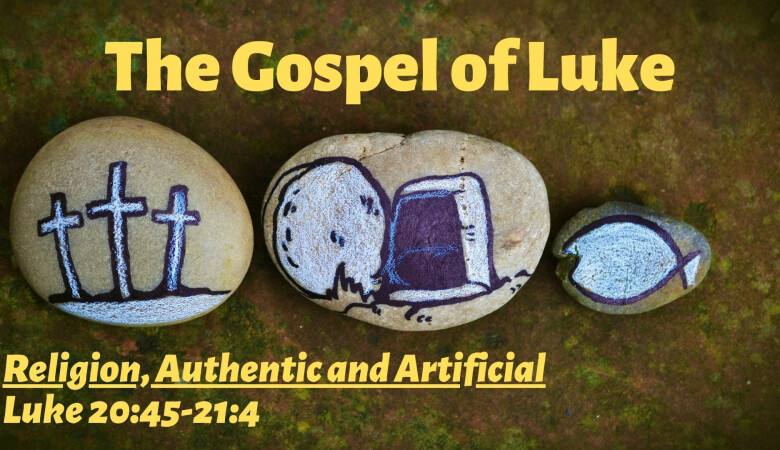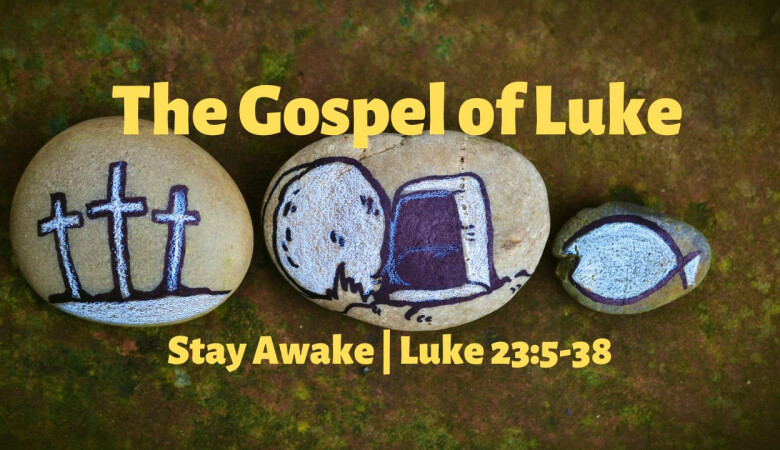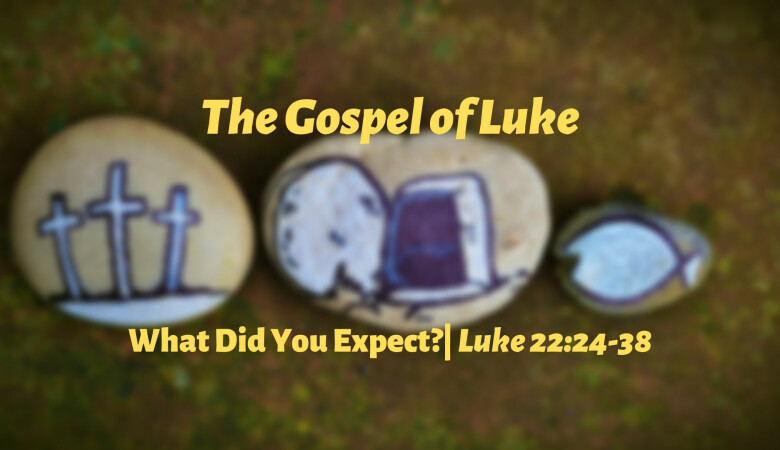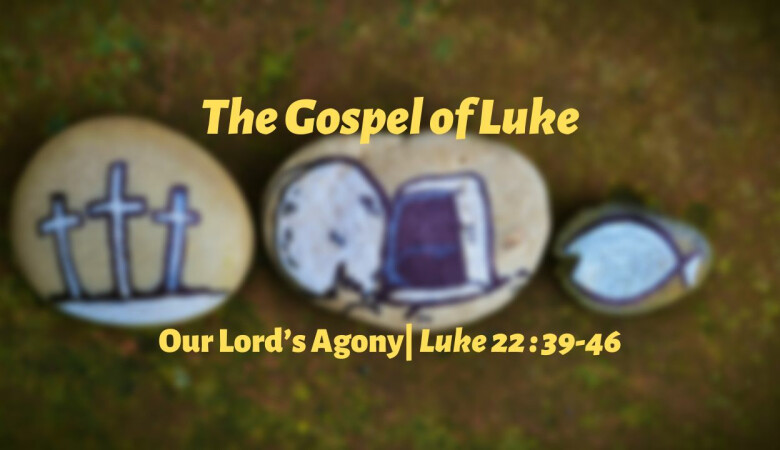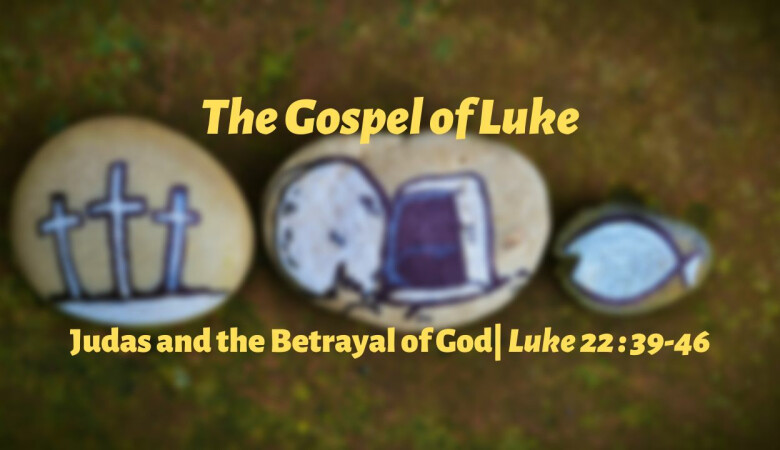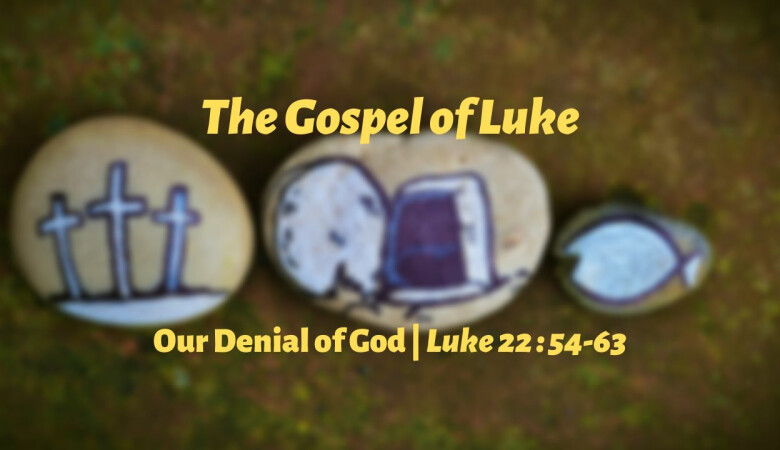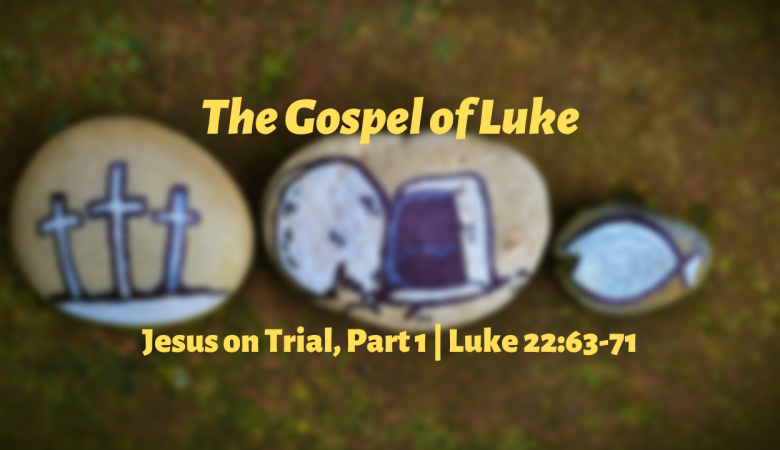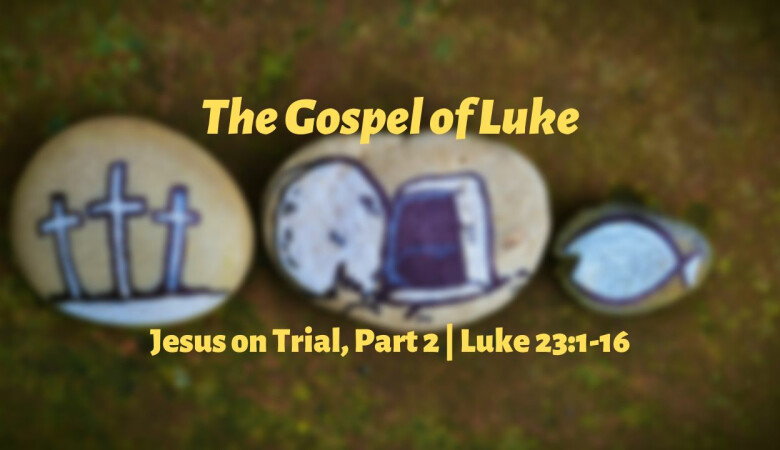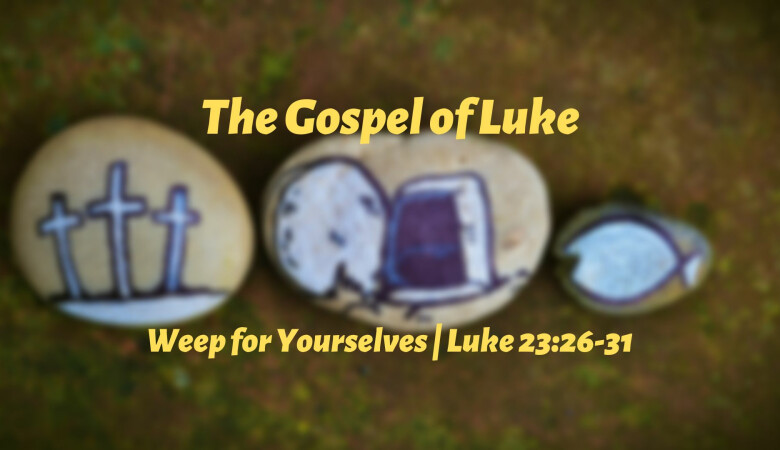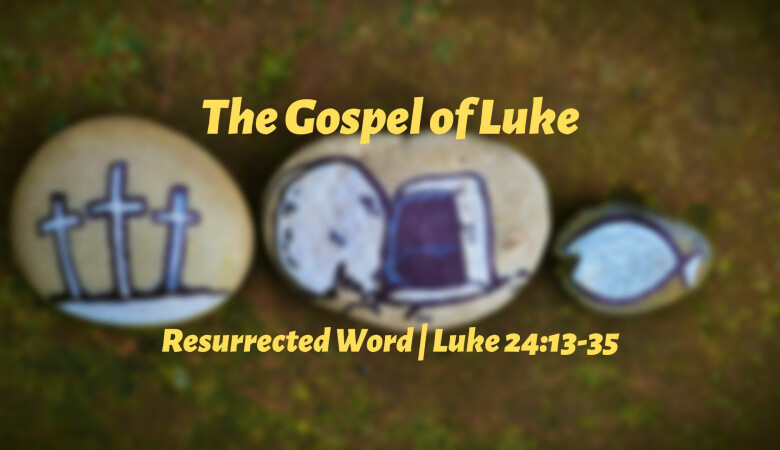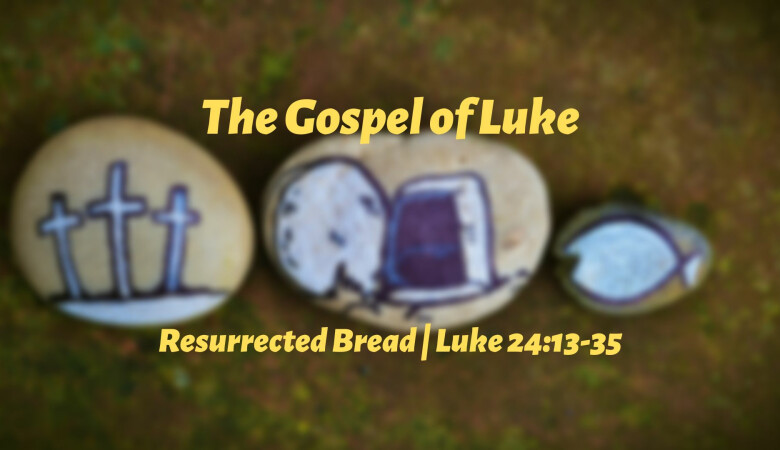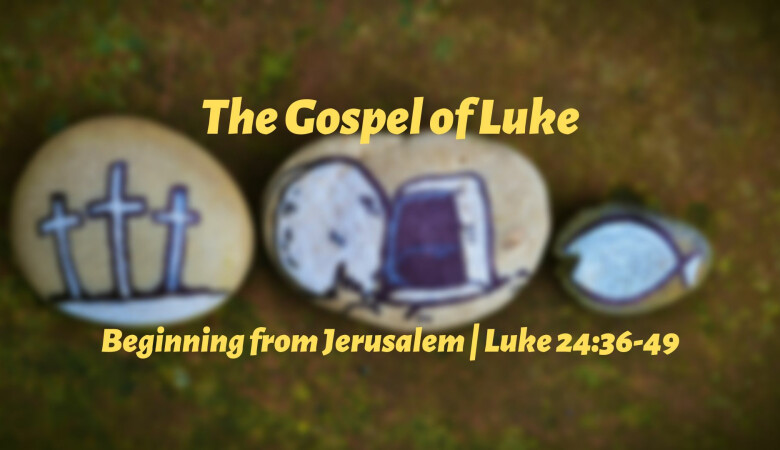Series: Luke
Who's Guilty
March 10, 2024 | Peter Rowan
Passage: Luke 23:18-25
ALL SERMONS IN SERIES
Summary
One of the rather strange aspects about the death of Jesus is that it seems as though many of the characters do it almost unintentionally, or at least their circumstances just kind of lead them into it. Of course, that's not the case with all of the characters; the chief priests and elders and scribes had clearly planned it out, paying off Judas, arresting Jesus at night, lying to Pilate and all of the rest. But think of Pilate, he initially declared Jesus innocent; think of Herod, he seems to just want to see the spectacle of Jesus but not to have him killed; and think of the crowd, they are there for Passover and they are shouting crucify him. But the truth is that we have all killed him. We all are at work against God. We are all guilty. And the wild, wild story of Barabbas is that the guilty one goes free while the righteous one suffers. And right here, right at the point the crowd yelling for the release of Barabbas and the death of Jesus, is the heart of the Christian message: the blameless for the wicked, the capital "S" Saint for the sinner, the righteous for the unrighteous. Who's guilty? We are. Who bears the guilt. Jesus does.
Transcript
My pastor growing up, Rob Rayburn, tells a story of a friend of his from Seminary (they actually went to the same seminary that I went to) and now man is a pastor down in Florida. I don’t know this man, but I think his story is remarkable. Let me tell it to you as Rob told it to Faith Presbyterian in Tacoma, Washington.
This man was born in Washington State, where I was born and raised. His mother was a Native American and she was a prostitute. She sold her body to make her living. He had twelve siblings, but none of them knew his or her own dad; the fathers might have been from hundreds of different men. He was one of the older children and often had to care for his younger brothers and sisters. It was a nightmare of a family. When he was a little boy the children would sleep six to a bed and most of them wet the bed. He also wet the bed and had done so for as long as he could remember. He was eventually placed in foster homes where he continued to wet the bed. Every single night he wet the bed. He was bitterly ashamed that he was a bed-wetter but was helpless to change. Every morning he woke up to wet bedclothes. One foster mother screamed at him “Bad boy; bad boy!” morning after morning. Another one held his nose in the wet bedclothes, as if she were house- training a dog. Another, if you can believe this, made him stand on the front porch, wrapped in his wet sheet, holding a sign that read, “This boy wets the bed.” That front porch stood right across the street from the school he attended.
He tried everything. He would hide his bed-wetting by making his bed in the morning even though the sheets were wet, only to have to crawl into a still damp and now putrid bed at night. He was given up by eight different foster homes at least in some part because he couldn’t stop wetting the bed. As you can imagine, now a boy of twelve, he lived with his shame and with his despair every single day. He was an utter failure. No one wanted him. He tried prayer, but it didn’t work. God either didn’t care about him or wasn’t there at all.
My guess is that as you heard that story, it produced so many thoughts and feelings in your mind and heart: immense pity for that little boy, anger and disgust at those who failed him. You probably thought of his mother, the men who purchased her services the fathers of those twelve children, the foster parents who probably took him in with a degree of compassion and care, but who found him so inconvenient and bothersome. What was wrong with these people that would treat this boy this way who wanted so much to change but didn’t know how?
But… His mother needed to make a living; she needed the drugs and alcohol that made her life bearable. She didn’t hate her kids, she wanted the best for them; she was doing the best she could. She wasn’t a bad person. The men were buying a service, they had no thought or intention of her becoming pregnant, they weren’t planning to father a child, it wasn’t their fault. The foster parents would have said that they meant to help, but he was difficult and couldn’t learn. They couldn’t wash sheets every day for the rest of their lives. The boy had to change. That is the story of human life and of the human heart in a nutshell.”
This is just a snapshot of this mans story, of his upbringing. And I think it gets at something very important in the narratives leading up to our Lord’s death.
In our passage we have the substitution of God for a criminal, Barabbas. We have here in Luke what is at the very heart of Christian faith and I want to get to that very important point that it is making, but I want you to sit for a moment, in all of the characters we have seen over this past month in Luke. You see, the substation of God is not just a substitution of his life for the life of Barabbas, but for us.
Think of who we have seen. Malchus, the high priest’s servant who probably had no clue what he was really doing. He just showed up that night to his job and was told they were going to head out to the mount of Olives to arrest someone. He certainly didn’t think that that night his ear would be cut off only to have it put back on and healed, but really he was probably just showing up to work.
Think of the soldiers standing around, mocking Jesus. They had arrested likely hundreds, maybe thousands of folk in their careers. Passing their time mocking those whom they arrested was just part of what they did, they really didn’t mean much by it. They were bullying, beating up someone who was helpless to respond, but it as also just another day on the job for them.
Think of the rulers, the judges. Some of them are an absolute sham. The “trial” - if you can call it that - that Jesus received by the Jewish leaders was pathetic. They were clearly making things up, but in there mind the true religion was at stake! These really were the good church folk of the time.
And Herod, you have to remember that Herod would have been praised in our day as a great governor or a fantastic mayor. Someone who got stuff done. He kept the peace and truly was rather remarkable in all of the building that he accomplished. And like a lot of our own political leaders, well, his personal ethics weren’t so great. And he really got heated when people pointed this out. This is largely why he killed John the Baptist. But really, what do we expect of our politicians in their personal lives?
I mentioned last week that Pilate was not even known outside of the Bible until some Italian archaeologist saw that a public monument was dedicated to him in Caesarea. He was sort of mid-level Roman management. And there is a huge crowd wanting the death of the Jesus who finds no fault in gathering and organizing in this provincial city which he was to keep the peace in. I mean, the gospel of Mark tells us that he “wished to satisfy the crowd” and that is why he handed over Jesus to be killed. Here is a man basically doing his job, trying to keep the peace in this city far far away from Rome that was still to be governed by Rome. He probably like his job a great deal of the time. What we see is that he certainly took his role seriously. He investigated Jesus and he spoke with his wife about it and all the rest.
Of course, we have seen the disciples. We saw Peter. What would you do in his shoes? He’s scared out of his mind. His big claims from the day before seem like years ago when you think that if you are found out you also might have to hang of a cross.
And think of the religious leaders, the elders, the scribes, the Pharisees and Sadducees that had come together to get rid of Jesus. They likely - actually, we know this is the case for the Pharisees and Sadducees - disagreed with one another on all kinds of different points of doctrine. They were theologians who had their opinions and held to many of them very stridently, but they weren’t seeking to have Jesus killed because he disagreed with them on baptism or church polity or how frequently to celebrate the Supper or if the extraordinary gifts of the Spirit are for us today. No!!, this man claimed to be God!! This is first order theology. They were claiming blasphemy. These were church-going folk. These were people that actually got to church on time even on the dreaded Spring-forward day of daylight savings.
But if I am making these characters and their actions out to be small or trivial, I certainly don’t intend to. No, rather, what I hope you see is that they are in many, many ways just like you. And their sword and club-wielding arrest, their sickening bullying self-amusing violence, their hatred against having their sin called-out, their self-preservation, their envy, their greed, their desire to keep their power, their frustration with their position in life, all of these different things are how they are also accomplices in the death of our innocent Lord Jesus.
There are just ordinary people in this story. Ordinary religious leaders, ordinary soldiers, ordinary politicians, ordinary criminals, but there are no good people in this. Not even our Lord’s disciples. If there is one thing that we are hearing in all of this again and again it is that we all bring our iniquities, our transgressions, our sins, our failures, our unrighteousness, our ordinary wickedness.
What I am saying is that Barabbas may be the really bad one here. Luke even seems to go out of his way for us to see this. Verse 19 - “a man who had been thrown into prison for an insurrection started in the city and for murder.” And verse 25 - “ He released the man who had been thrown into prison for insurrection and murder”. At the beginning and at the end of this story we are supposed to see that he was both a murderer and an insurrectionist. There is supposed be zero doubt in your mind that this man was in the wrong. The one, who on some level, we all see and we think, yeah, he deserved it. And, right alongside of this, what is painfully clear in this little account is that Jesus didn’t deserve death. (Verse 22 - A third time he said to them, “Why? What evil has he done? I have found in him no guilt deserving death. I will therefore punish and release him.”
Jesus gets sentenced to die when he had done nothing wrong and Barabbas gets sentenced to life when he had done such horrendous evil. But the story is so much bigger than that. The story, really, when we take all of these characters together, is that we have all done wrong and we get life. (and Mark seems to be at pains to tell us that it was the crowd - all of it - that wanted Jesus to die instead of Baribas.
But friends, this really is at the heart of the Christian message. Ordinary people behave very badly. You and I sin. Your neighbor, who probably really is seeking to love their children and show up to work and all of the rest, are unrighteous. We bring the sin. And it is so often done in the very ordinary of our lives. But in the story of salvation, it is the sinner that gets released and the righteous Son of God who dies.
The Bible tells us this again and again and again.
“…he was wounded for our transgressions; he was crushed for our iniquities; upon him was the chastisement that brought us peace, and with his stripes we are healed. All we like sheep have gone astray; we have turned — everyone — to his own way; and the Lord has laid on him the iniquity of us all.”
“Behold the lamb of God who takes away the sin of the world.” [John 1:29]
(Gal. 3:13) “Christ redeemed us from the curse of the law by becoming a curse for us — for it is written, ‘Cursed is everyone who is hanged on a tree.” Gal. 3:13
That’s why in providence of God Jesus had to be crucified; crucifixion was a man actually hanging on a tree. So it was no accident that Jesus was put to death this way.
(Hebrews 9:28) “…Christ, having been offered once to bear the sins of many…”
(1 Pet. 3:18) “For Christ…suffered once for sins, the righteous for the unrighteous, that he might bring us to God…”
(Isaiah 53:9) “He was assigned a grave with the wicked…even though he had done no violence nor was any deceit in his mouth.”
Let me get back to the story my pastor told of the man who is now a PCA pastor in Florida; the little boy of twelve who still wet the bed every night. There was a fisherman and his wife who were too old to have children — a Christian couple — and they decided to adopt him and his sister. You might have thought this would come as a great relief to a boy who had been passed around and then rejected so many times in his young life: having been in eight different foster homes by this time. But he was terrified that he was going to ruin this as well and that when they found out that he wet the bed they would get rid of him as everyone else had done.
At their first meeting the couple took the kids to a Chinese restaurant. He didn’t know anything about Chinese food or how to eat it. It was a disaster, he thought. He didn’t come off very well. Then they went bowling. He was an awful bowler and was embarrassed by how badly he did and was wondering if they already thought they’d made a mistake in adopting him.
He figured he better prepare them for the worst so he told his new mother, “I’m going to wet the bed, I always do.” She replied, “We know that. It’s alright.” And she clutched him in a big hug and told him, “I’ve been waiting for you all my life.” That night, for the first time, he didn’t wet the bed; and he never did again!
What is the answer to our shame? What is the answer to our guilt? What is the answer to the ways we sins and they ways we have been sinned against? What is the answer to the ordinary and extraordinary sins? It is love. It is love. it is self-giving, sacrificial, unconquerable love. And that is what we see here. Jesus life for yours. Utterly awful behavior being overcome by love. Jesus didn’t have to go to the cross; he willfully went to the cross for you and for me.
Luke really does want us to see how horrible and vicious ordinary people are because he doesn’t just want us to see Barnabas free but us free from our bondage to our pride and our selfishness and our foolishness.
The Midlevel theologian Anselm wrote the book Cur Deus Hoomo? He addressed the question “Why could God not simply wipe out man’s sin without requiring Christ to die?” It’s a good question and probably one that some of you have wrestled with. And he answers that question this way: “You have not yet considered how great is the weight of sin.” If you understand the weight of sin, you will start to understand the need for Jesus. But also, if you start to understand the willingness of Jesus to die in your place, you will not only see how awful your sin is but even more how great his love for you is.
Series Information
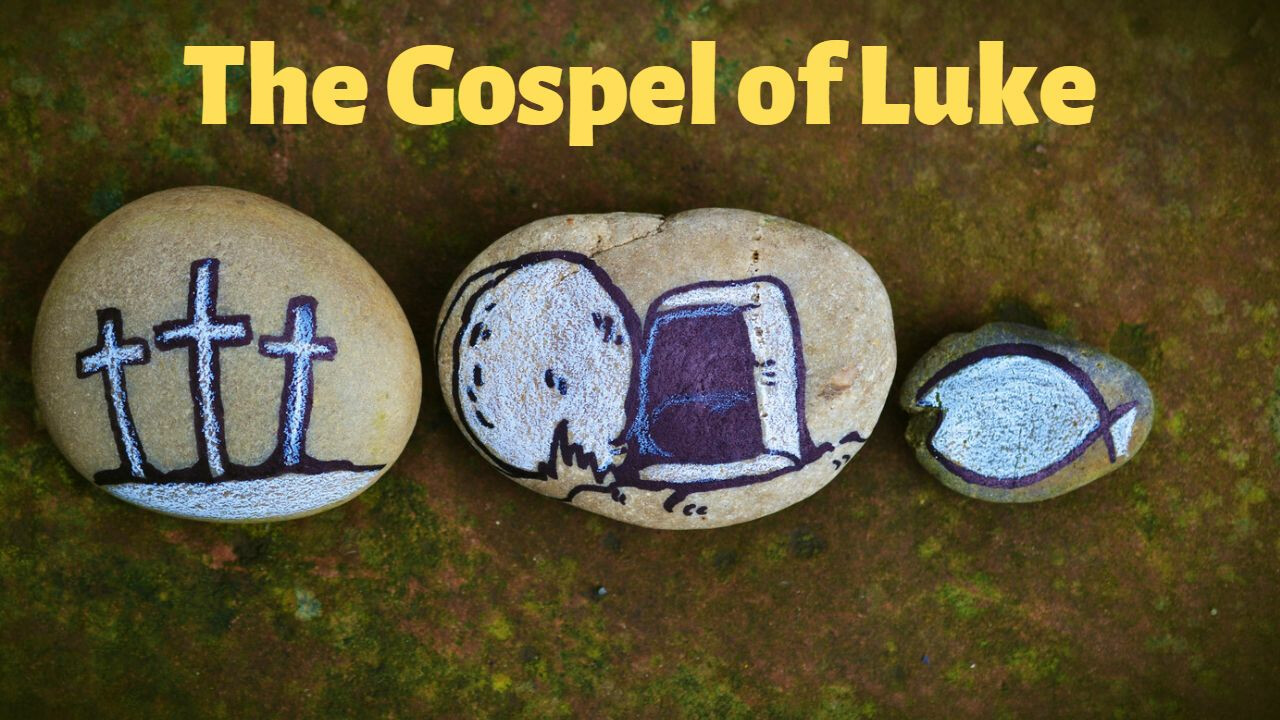
The Gospel of Luke is best described by its author in the first four verses of the book: "Many have undertaken to draw up an account of the things that have been fulfilled among us, just as they were handed down to us by those who from the first were eyewitnesses and servants of the word. With this in mind, since I myself have carefully investigated everything from the beginning, I too decided to write an orderly account for you, most excellent Theophilus, so that you may know the certainty of the things you have been taught."


